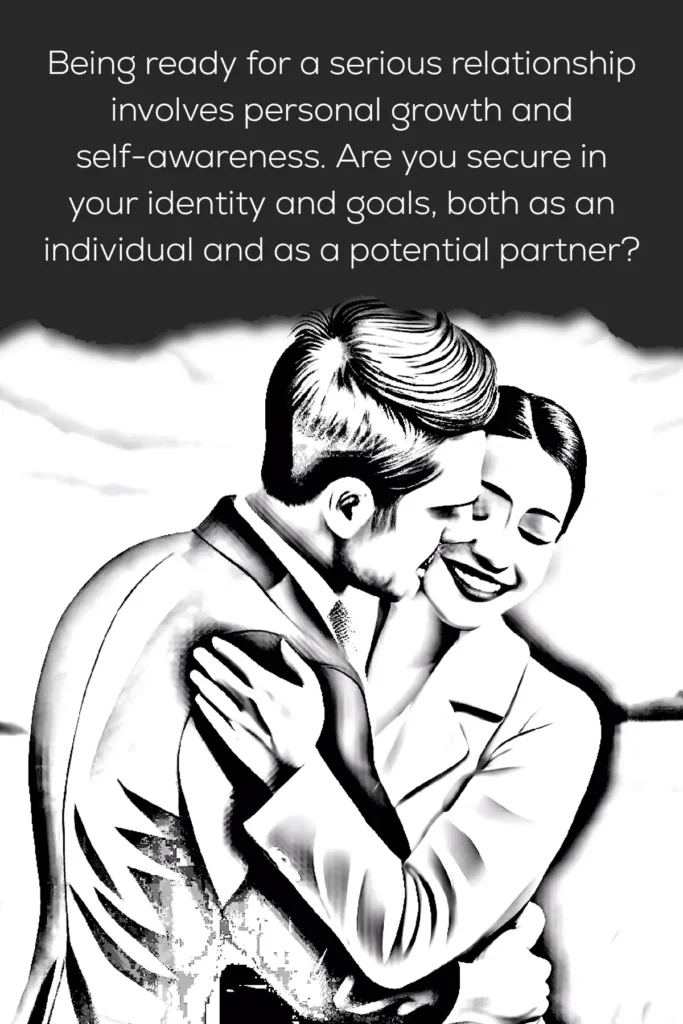Discover 13 ways to know if you’re ready for a serious relationship?
This blog post may contain affiliate links. If we find a product or service to be useful, we encourage you to visit the website via that link. If you make a purchase through our referral link, we may receive a commission. Rest assured, you will not be charged any additional fees. By using these links, you can support us while making your purchase. For more information visit here.
I. The ultimate guide: How Do You Know If You’re Ready For A Serious Relationship?
Looking at several aspects of your life and emotions can help you determine whether you’re ready for a committed relationship. Consider your own development, how you manage your emotions, and whether you can communicate and come to agreements with a partner.
Knowing your goals, your values, and what’s important to you both individually and jointly is typically a sign that you are prepared for a committed relationship.
Other crucial indicators include being willing to put in the effort and work for the relationship, being okay with committing, and having each other’s trust.
Having friends and family that support you and being able to handle challenges well can also help you create a healthy and committed relationship. Let’s start with the topic: “How do you know if you’re ready for a serious relationship?”
A. Understanding the Meaning of Serious Relationships
Serious relationships carry significant weight and reflect the emotional commitment between two people. That is, two people show emotional commitment in serious relationships. They require a significant investment of time, effort, and vulnerability. Before embarking on such a journey, it is important to assess your own readiness.
B. The importance of self-evaluation
Self-reflection plays a crucial role in determining whether something is truly preparing you for a serious relationship. It allows you to evaluate various aspects of your life, emotions, and desires to ensure that you are entering into a relationship on a solid foundation.

II. Assess your emotional readiness
A critical step in figuring out whether you’re prepared for a serious/meaningful relationship is evaluating your emotional readiness. It entails reflection on your emotional stability and capacity for handling and expressing feelings. Think about how well you handle stress, express your emotions, and keep your emotional well-being in balance.
A. Assess your emotional stability
Emotional stability is the foundation of a lasting relationship. Examine your emotional well-being and identify areas that may need attention. Strengthening emotional stability means cultivating resilience and coping mechanisms to navigate the difficulties of a committed partnership.
a. Identify and address emotional baggage
Unresolved emotional baggage from the past can hinder the success of future relationships. Acknowledge and work through past traumas or insecurities to avoid bringing them into new relationships. Seek professional help if necessary to facilitate healing and personal growth.
b. Work on past traumas or insecurities:
To be ready for a serious relationship, it is important to address any lingering past trauma or insecurities. This may involve therapy, self-reflection, and setting healthy boundaries. Resolving these issues will create a solid emotional foundation for a future partnership.
B. Identify your emotional availability:
Being emotionally available is essential to building a deep connection with a partner. Assess your willingness to open up and be vulnerable. Explore your current emotional state and consider any emotional walls or fears that may be preventing a genuine connection. Being honest with yourself will allow for more authentic relationships.
a. Assess your willingness to open up and be vulnerable.
Openness and vulnerability are at the heart of any serious relationship. Consider your ability to share your feelings, needs, and desires with a partner. Reflect on your ability to express yourself and be receptive to your partner’s feelings.
III. Analyze Your Relationship History
Analyzing your past relationships in detail is crucial to determining whether you are ready for a committed partnership. Consider your past experiences—both successful and unsuccessful—and what you learned from them.
Analyze your approach to overcoming obstacles, collaborating with others, and resolving disputes. This introspection might offer insightful information about your development and readiness for a more committed engagement.
A. Reflect on your past relationships.
Your past relationships provide valuable insight into your own patterns and behaviors. Take a moment to reflect on these experiences and the lessons they have taught you. Consider the positive aspects and the mistakes that were made.
a. Learn from past mistakes:
Mistakes are opportunities for growth. By acknowledging and learning from your past mistakes, you can consciously avoid repeating them in future relationships. Take note of any recurring patterns or negative behaviors that may have contributed to the demise of past partnerships.
b. Identifying Recurring Patterns or Relationship Behaviors
Patterns often emerge in relationships, highlighting areas that need attention. Analyze your behaviors and choices in past relationships to identify any problematic patterns that need to be addressed before making a serious commitment.
B. Evaluate the reasons for past relationship failures:
Relationship failures provide valuable insight into personal contributions to the problems. Take responsibility for any negative roles you have played and take steps toward personal growth. Resolving these issues will allow for healthier connections in future endeavors.
a. Recognize your personal contribution to relationship issues:
Successful relationships require constant self-reflection and growth. Recognize your own role in past relationship challenges and identify areas for personal improvement. This self-awareness will help you create a healthy dynamic moving forward.
b. Resolve and improve past mistakes:
Take proactive steps to resolve past mistakes and develop healthy relationship habits. Seek therapy, engage in self-help materials, or use relationship resources to address problematic patterns and behaviors. Improving yourself ultimately sets the stage for stronger future relationships.

IV. Establishing Life Priorities and Goals
Examining your priorities and aspirations in life is necessary to determine your suitability for a committed partnership. Spend some time reflecting on your personal goals, professional aspirations, and lifestyle preferences. Think about whether your ideals and theirs match, as well as whether you two have similar future goals.
This evaluation will assist you in deciding whether you are prepared to start a committed relationship that supports your unique and shared life goals.
A. Determining personal life goals:
Before entering into a serious relationship, it is important to understand clearly your own life goals. Engage in self-discovery and self-fulfillment to develop a strong sense of identity and purpose. Set short- and long-term goals that are consistent with your personal values and desires.
a. Self-Discovery and Self-Fulfillment
Self-discovery involves exploring your passions, preferences, and dreams. Prioritize understanding yourself on a deeper level and embracing personal growth. This process allows you to build a solid foundation for a serious relationship by knowing who you are and what you want.
b. Map out your short- and long-term goals
Create a roadmap of where you want to go in life, both in the short and long term. Set achievable goals that are consistent with your values and consider how a serious relationship may affect those goals. Balancing personal goals with relationship commitments is critical to long-term compatibility.
B. Considering the impact of a serious relationship on your goals:
Entering into a serious relationship requires careful consideration of how it aligns with your personal goals. Evaluate how a partner’s goals and aspirations may complement or conflict with your own. Open communication regarding life plans and expectations is key to establishing a solid foundation for the future.
a. Balancing personal goals with relationship commitments:
Balancing personal ambitions and relationship commitments is essential for a harmonious partnership. Work toward aligning your life goals with those of your potential partner, ensuring mutual support and shared aspirations.
b. Evaluating compatibility with a potential partner’s goals
Before committing to a serious relationship, it is crucial to assess how compatible your goals and aspirations are with those of your partner. Discuss future plans openly, explore shared visions, and assess if they need adjustments to create a harmonious journey together.
The disadvantages of a committed relationship may include the possible loss of personal independence, concessions to individual goals, conflict resolution, and the emotional commitment required. This can lead to anxiety and vulnerability.
**Committed Relationships**
V. Evaluating Your Financial Preparedness
Identifying your suitability for a committed relationship requires taking a financial readiness assessment. Examine your financial security, ability to stick to a budget, and long-term financial objectives. Think about how at ease you are having frank and collaborative financial discussions with a partner.
Building a solid foundation in a committed relationship requires that both parties are clear about their financial obligations and expectations.
A. Assessing your financial stability:
Financial stability is an important aspect to consider before entering into a serious relationship. Evaluate your personal financial situation, including income, savings, and debt. Being financially stable allows for a more secure and balanced relationship.
a. Understanding your personal financial situation:
Take a comprehensive look at your current financial standing. Understand your income, expenses, assets, and liabilities. This will provide a clear picture of your financial stability and help you make informed decisions regarding a serious commitment.
b. Being financially independent before committing to a serious relationship:
Financial independence establishes a sense of security and self-sufficiency. Ensure you have the means to meet your own needs and contribute to shared financial responsibilities. Being self-reliant financially fosters a fair partnership.
B. Discussing financial expectations with a potential partner:
Open communication about finances is crucial to building a strong foundation for a serious relationship. Discuss financial expectations, beliefs, and goals with a potential partner. Alignment in financial values can mitigate future conflicts and ensure compatibility.
a. Emphasizing open communication around finances:
Transparency and open communication create a solid foundation for discussing finances. Be honest about personal financial situations, including debt, spending habits, and long-term financial goals. Cultivating an environment of trust strengthens the bond between partners.
b. Assessing compatibility with financial values and goals:
Before embarking on a serious commitment, evaluate compatibility in financial values and goals with your potential partner. Consider aspects such as attitudes toward saving, spending habits, and long-term financial plans. Aligning these values lays the groundwork for a financially harmonious future together.
VI. Self-Sufficiency and Interdependence
When determining whether you are ready for a committed relationship, it is crucial to examine the relationship between interdependence and self-sufficiency.
Examine your capacity to uphold your independence while remaining open to partnering in life. Think about how at ease you are relying on others and receiving reliance in return. Finding a balance between these elements is essential for developing a strong, supportive partnership.

A. Becoming self-sufficient emotionally
Emotional self-sufficiency is essential for a healthy and balanced relationship. Cultivate healthy coping mechanisms, such as self-reflection, self-soothing, and pursuing individual hobbies and interests. Avoid falling into a codependent dynamic where emotional well-being solely relies on a partner.
a. Developing healthy coping mechanisms
Discover and develop healthy ways to process emotions and cope with stress. Engage in activities that bring you joy, prioritize self-care, and establish a support system outside of a romantic relationship. This emotional self-sufficiency strengthens your overall well-being.
b. Avoiding a codependent relationship dynamic
Codependency can be detrimental to both individuals involved in a relationship. Strive to maintain a healthy balance between your own needs and the needs of your partner. Nurture personal growth and individuality while also fostering interdependence in your connections.
B. Striking a balance between independence and interdependence
A healthy and serious relationship involves maintaining your own identity while fostering interdependence on your partner. Ensure that you keep your own interests, friends, and personal growth pursuits. Foster mutual support and reliance within the boundaries of a harmonious partnership.
a. The importance of maintaining your identity in a relationship:
Nurturing your identity outside of a relationship is crucial for personal growth and overall satisfaction. Remember to invest time and energy in the activities and relationships that make you who you are. Maintaining your individuality enhances your ability to contribute to a successful partnership.
b. Nurturing a healthy level of reliance on a partner
While independence is important, cultivating interdependence is equally valuable. Recognize and appreciate the support your partner provides, allowing room for vulnerability and growth. Strike a healthy balance between self-sufficiency and reliance on your partner.
VII. Assessing Relationship Compatibility
Identifying your readiness for a committed relationship requires taking into account your relationship compatibility. Consider whether your potential spouse and you have comparable values, communication preferences, and life objectives. Think about how successfully you negotiate differences and complement each other’s strengths. To build a long-lasting, meaningful, and serious relationship, it is must to have a solid base of compatibility.
A. Identifying shared values and interests
Shared values and interests create a strong foundation for a serious relationship. Explore common ground in important areas such as family, spirituality, ethics, and personal goals. Shared values enhance bonding and mutual understanding.
a. Exploring common ground in important areas:
Delve into meaningful conversations to identify areas of shared values and interests. Discuss topics such as politics, religion, and long-term goals to assess compatibility. Recognizing commonalities deepens the connection and fosters a sense of understanding.
b. Recognizing potential areas of conflict:
While shared values are important, it is crucial to identify potential areas of conflict as well. Acknowledge differences and discuss how they can be managed within the context of a harmonious relationship. Open dialogue surrounding potential conflicts fosters better understanding and compromise.
B. Evaluating compatibility in lifestyle choices
Lifestyle choices can significantly impact relationship dynamics. Assess similarities and differences in daily routines, communication styles, and leisure activities. Compatibility in lifestyle choices allows for smoother day-to-day interactions and shared experiences.
a. Assessing similarities and differences in daily routines:
Understanding and accepting your partner’s daily routines and habits is essential for long-term compatibility. Explore your compatibility in areas such as sleep schedules, work-life balance, and leisure activities. Finding harmony in these routines promotes healthier and more fulfilling connections.
b. Discussing future plans and expectations
Openly communicate your long-term plans and expectations with your potential partner. Discuss topics such as marriage, children, and where you see yourselves in the future. Ensure alignment in these aspects to create a shared vision and minimize future clashes.
VIII. Communication and Conflict Resolution Skills
When determining whether you’re ready for a committed relationship, having effective communication and conflict resolution skills is crucial. Consider how successfully you communicate your ideas and emotions to others and your capacity for attentive listening.
Think about how you handle disagreements and whether you can work together to find solutions in a courteous and helpful way. These abilities are essential for developing a stable and satisfying serious relationship.
A. Assessing your communication style:
Effective communication is the cornerstone of a successful relationship. Reflect on your communication style, identifying strengths and areas for improvement. Strive to enhance active listening, clarity, and empathy in your interactions with others.
a. Recognizing strengths and areas for improvement:
Evaluate your interpersonal communication skills, considering your ability to express yourself clearly and empathetically. Acknowledge your strengths while actively seeking opportunities for growth. Effective communication enhances understanding and minimizes misunderstandings.
b. Honing effective communication skills:
Continually work on improving your communication skills, paying attention to active listening, nonverbal cues, and the ability to express emotions effectively. Develop healthy habits such as using “I” statements and seeking to understand before being understood. Cultivating these skills strengthens your connection with others.
B. Identifying conflict resolution strategies:
Conflict is inevitable in any relationship. Recognize the importance of healthy confrontation and effective resolution techniques. Evaluate compatibility with a potential partner in resolving disagreements and navigating conflicts maturely.
a. Learning healthy confrontation techniques:
Conflict resolution involves open and respectful communication, active listening, and compromise. Familiarize yourself with constructive confrontation techniques, such as using “I” statements and expressing your needs without blame. Cultivating these skills promotes a harmonious and mutually supportive partnership.
b. Assessing compatibility in resolving disagreements:
Conflict resolution styles can differ between individuals. Assess whether you and your potential partner share similar approaches to resolving disagreements. This compatibility contributes to a more peaceful and sustainable relationship.

IX. Emotional Maturity and Empathy
When determining whether you’re prepared for a committed relationship, it is critical to evaluate your emotional maturity and empathy. Examine your capacity for comprehension and sympathy for the emotions and experiences of your spouse or anyone.
Think about how you control your emotions and react to difficulties with empathy and thought. Emotional maturity and sensitivity form the foundation of a strong and authentic relationship.
A. Cultivating emotional maturity:
Emotional maturity enables healthy communication, self-regulation, and empathy. Foster self-awareness by observing your emotional reactions and taking responsibility for your responses. Cultivating emotional maturity enhances your ability to navigate the complexities of a serious relationship.
a. Developing self-awareness and self-regulation:
Engage in introspection to better understand your emotional triggers and reactions. Strive to regulate your emotions, avoiding impulsive or harmful behavior. Self-awareness and self-regulation promote emotional stability and empathy in relationships.
b. Enhancing empathy and understanding:
Empathy is essential for fostering deep connections with others. Work on enhancing your ability to understand and validate your partner’s emotions. Engage in active listening and practice putting yourself in their shoes. Cultivating empathy strengthens the emotional bond between partners.
B. Assessing emotional intelligence in potential partners:
Emotional intelligence is a crucial factor in successful relationships. Pay attention to signs of emotional maturity and empathy for potential partners. Recognize the importance of a partner who can understand, respond, and support you emotionally.
a. Identifying signs of emotional maturity:
Observe how a potential partner handles their own emotions and navigates challenging situations. Look for indicators of emotional maturity, such as self-reflection, empathy, and communication skills. Emotional maturity in a partner contributes to a more fulfilling and harmonious relationship.
b. Recognizing the importance of empathy in a serious relationship:
Empathy bridges emotional gaps and fosters a deep understanding between partners. In a serious relationship, having a partner who can empathize with your experiences creates a nurturing and supportive environment. Cultivate empathy within yourself and seek partners who understand its significance.
X. Establishing Trust and Honesty
One of the most important aspects of figuring out whether you’re ready for a serious relationship is building trust and being honest. Think about your capacity for being honest and open with your partner, expressing both your strengths and weaknesses. Examine whether confiding in each other makes you feel secure. A solid and long-lasting serious relationship relies on trust and honesty.
A. Learning to trust again:
Past experiences may have caused trust issues, but it is vital to address and overcome them before entering into a serious relationship. Work on healing any wounds, building self-confidence, and being open to vulnerability. Trust is the foundation of meaningful and long-lasting connections.
a. Overcoming trust issues from past experiences
Seek healing and closure from past experiences that have affected your ability to trust. Engage in personal growth activities such as therapy or self-help resources to address trust-related challenges. Allow yourself time to heal before entering into a serious commitment.
b. Cultivating trust through open communication
Open and honest communication is the key to establishing and maintaining trust in a serious relationship. Create a safe space for both you and your partner to share thoughts, feelings, and concerns. Building trust requires transparency and vulnerability.
B. Evaluating the honesty and integrity of a potential partner:
Assessing the honesty and integrity of a potential partner is vital to a healthy relationship. Pay attention to red flags and subtle signs of dishonest behavior. Establishing a foundation of trust requires choosing a partner with whom you have confidence and shared values.
a. Recognizing red flags and dishonest behaviors:
Be attentive to potential partners who exhibit signs of deception, inconsistency, or lack of integrity. Dishonesty erodes trust and hinders the growth of a serious relationship. Stay vigilant and prioritize honesty in your connections.
b. Building a foundation of trust in a serious relationship:
Consistency, honesty, and open communication are the building blocks of trust in a serious relationship. Prioritize integrity in your own actions and encourage your partner to do the same. Building trust is an ongoing process that strengthens with time and consistency.
XI. Assessing Relationship Expectations
When considering whether you are ready for a serious relationship, one of the crucial factors to evaluate is your personal relationship expectations. Take the time to reflect on what you truly want and need in a relationship.
A. Reflecting on personal relationship expectations
Understanding your readiness for a meaningful commitment requires taking some time to consider your personal relationship expectations. Think about the partner you want and the kind of relationship you want. Think about things like communication, agreed principles, and long-term objectives. This self-awareness can help you decide whether you’re ready for a committed and lasting relationship.
a. Understanding needs and desires in a relationship
Begin by identifying your emotional and practical needs in a partnership. Do you crave emotional intimacy, companionship, or shared goals? Are you looking for someone who can support you in your aspirations and help you grow? Identifying these needs will allow you to be more aware of what you require from a serious relationship.
b. Evaluating if expectations are realistic and healthy
It’s essential to assess whether your relationship expectations are realistic and healthy. It’s normal to desire love and connection, but it’s crucial to ensure that these expectations do not stem from unrealistic ideas of a perfect relationship. Evaluate if your expectations align with what a healthy and fulfilling partnership entails.
B. Discussing expectations with a potential partner
Once you have reflected on your own expectations, it is crucial to open up and discuss them with a potential partner. Honest and open communication about your individual relationship visions is vital for building a solid foundation. This dialogue will allow you to assess compatibility in meeting each other’s expectations.
a. Communicating openly about individual and relationship visions
Express your desires and expectations clearly to your potential partner and encourage them to do the same. A healthy conversation about your relationship visions will help you understand if you are both on the same page and if your goals align.
b. Assessing compatibility with meeting each other’s expectations
During these discussions, pay attention to how well your expectations mesh with each other. Evaluate if there is a healthy balance, understanding, and willingness to compromise in areas where there might be differences. Assessing compatibility with meeting each other’s expectations is vital for a successful and fulfilling long-term relationship.

XII. Ready for Commitment: The Signs
Now that you have assessed your relationship expectations, it’s time to evaluate whether you are ready for a serious commitment. Here are some signs that indicate you may be ready for a serious relationship.
A. Feeling secure in yourself and your life
Before embarking on a serious relationship, it’s essential to feel secure in yourself and your life. This means having self-assurance and confidence in who you are as an individual.
a. Self-assurance and confidence
Being confident in yourself allows you to bring a strong sense of self into a relationship. It helps you establish healthy boundaries, express your needs, and contribute positively to the partnership. Confidence is crucial for fostering trust and open communication in a serious relationship.
b. Contentment with your current circumstances
Feeling content with your current circumstances is another sign that you may be ready for a serious relationship. It means being satisfied with your personal journey, in terms of career, personal growth, and overall fulfillment. Contentment allows you to complement a partner’s life rather than relying on them solely for your own happiness.
B. Feeling excited about the future with a potential partner
When you’re ready for a serious commitment, you will feel genuine excitement about the future with a potential partner. This excitement goes beyond the initial infatuation and extends to the desire to build a life together.
a. Eagerness to grow and build a life together
Being ready for a serious relationship means being eager to grow and build a future together. It involves shared goals, dreams, and a willingness to work together as a team to achieve them. This eagerness fosters a sense of partnership and mutual support that is essential for a long-lasting commitment.
b. Sustaining passionate love beyond the honeymoon phase
A crucial aspect of being ready for a serious relationship is understanding that passion and love evolve beyond the honeymoon phase. It means being willing to put in the effort to sustain emotional and physical intimacy as the relationship progresses. This deepening love comes from a genuine commitment to one another and a desire to invest in the relationship’s long-term success.
XIII. Summary
In this article, we have explored the essential factors to consider when assessing if you are ready for a serious relationship. We discussed the importance of reflecting on personal relationship expectations and the significance of open communication with a potential partner. Additionally, we examined the signs of being ready for commitment, including feeling secure in yourself and your life, and being excited about a shared future.
XIV. FAQs (Frequently Asked Questions)
Here are some commonly asked questions about readiness for a serious relationship:
How long does it take to know if you’re ready for a serious relationship?
The timeframe for knowing if you’re ready for a serious relationship varies for each individual. It depends on your self-awareness, personal growth, and readiness to prioritize a long-term commitment. Take the time to reflect and evaluate your emotions and expectations.
Can someone be ready for a serious relationship without experiencing previous relationships?
Yes, someone can be ready for a serious relationship without prior romantic experiences. What matters most is your level of self-awareness, emotional maturity, and readiness to invest in a committed partnership. Previous relationships are not the sole determining factor.
What role does self-love play in being ready for a serious relationship?
Self-love is crucial when it comes to being ready for a serious relationship. It involves knowing your worth, setting healthy boundaries, and prioritizing your own happiness and well-being. Without self-love, it may be challenging to bring your best self into a partnership.
Is it okay to compromise on certain goals for the sake of a serious relationship?
Compromise is an essential aspect of any successful relationship. However, it’s important to strike a balance between compromise and retaining your personal values and goals. Evaluate each situation individually and determine if compromise aligns with your overall happiness and growth.
How can I address commitment issues before entering into a serious relationship?
Addressing commitment issues requires self-reflection and often benefits from professional guidance. Consider therapy or counseling to delve deeper into any underlying fears or anxieties about commitment. Working through these issues will pave the way for a healthier and more fulfilling serious relationship.
Conclusion
In conclusion, assessing your relationship expectations, communicating openly with a potential partner, and recognizing the signs of readiness for commitment are crucial steps in determining if you are ready for a serious relationship. Remember to prioritize self-reflection and personal growth before pursuing a long-lasting and fulfilling partnership. By doing so, you increase the chances of building a strong and mutually satisfying relationship. Thank you for reading.
Understanding the importance of copyright law is absolutely vital, as it strictly prohibits any reproduction or replication of works without the explicit permission of the author. Any unauthorized duplication of content will lead to legal action for copyright infringement under Section 14 of the Copyright Act.











